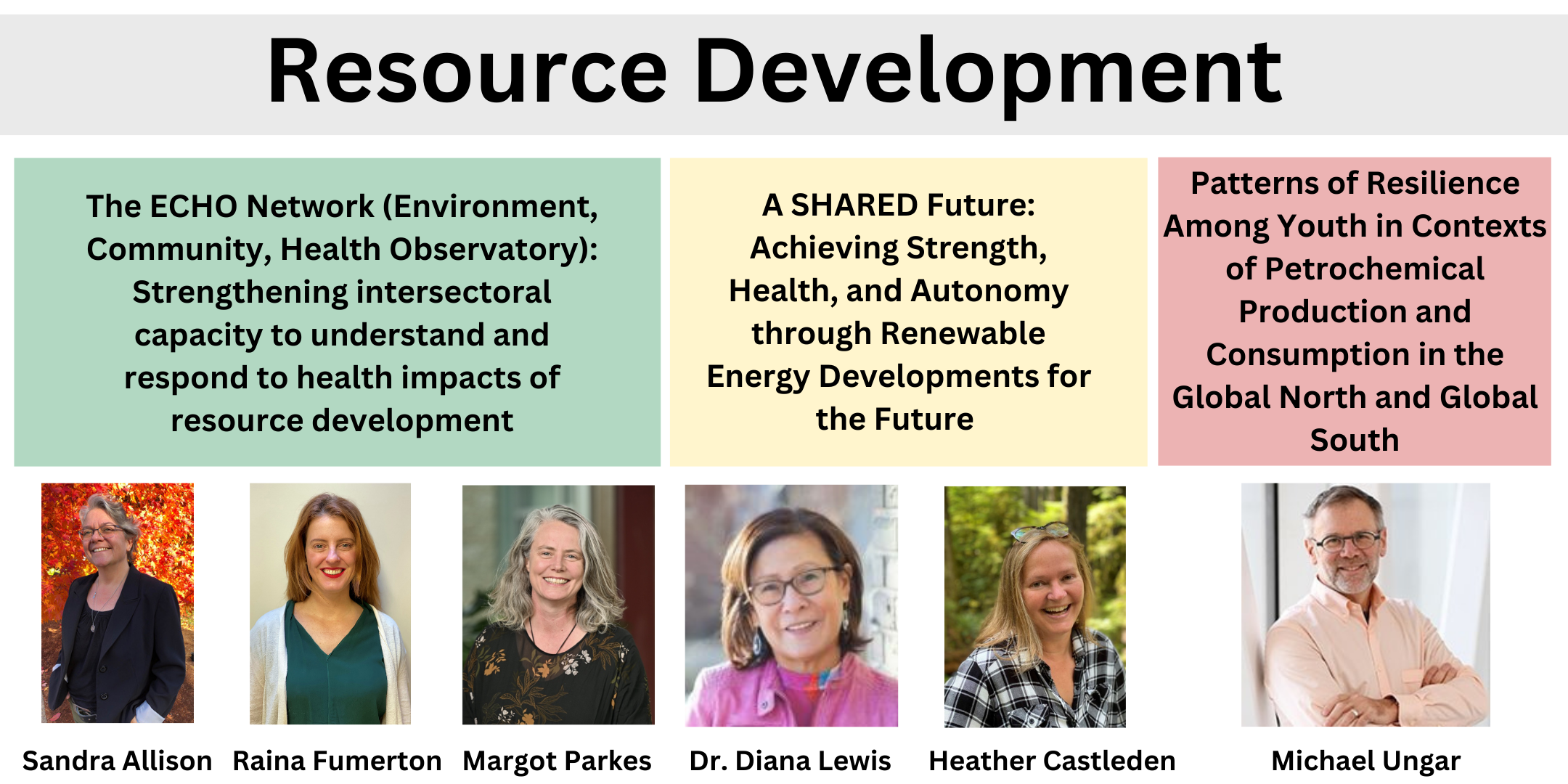- Location
- Zoom
- Series/Type
- DLSPH Event, Faculty/Staff Event, Seminar, Student Event
- Format
- Online
- Dates
- March 9, 2023 from 12:00pm to 1:30pm
Links
Health is influenced by resource development through interrelated socioeconomic, ecological, cultural, and political pathways, which demand upstream, intersectoral responses. For example, both oil and gas production and the process of consumption (as it relates to climate change) have large impacts, both positive and negative, on social, economic and environmental systems that affect people’s mental health and overall wellbeing. These relationships are especially important in Canada, where the economy remains tightly coupled with the development of natural resources and where the rate and scale of social and environmental change occurring in resource-rich regions is fueling debate regarding health impacts, especially for rural, remote and Indigenous communities. To better understand these connections, the Canadian Institutes of Health Research funded three projects to look at how to understand and respond to the health impacts of climate change, and the relationship between a healthy natural world and healthy people. In this webinar, learn what researchers have discovered and where they plan to go next.
About the Projects
The ECHO (Environment, Community, Health Observatory)Network: Strengthening intersectoral capacity to understand and respond to health impacts of resource development
The ECHO Network is focused on working together across sectors to take notice of – and respond to – the influence of resource extraction on health and well-being, with specific emphasis on rural, remote and Indigenous communities and environments. ECHO brings together researchers and knowledge-holders across health, environment and community sectors who have identified the need to better understand and address the cumulative health, equity and ecological challenges of resource extraction and climate change. The ECHO Network is anchored in knowledge exchange partnerships in New Brunswick, Alberta, and British Columbia, with connections across Canada and Oceania. ECHO has developed a platform of integrative tools and processes to strengthen intersectoral capacity, and to connect people to information, practices and shared perspectives across generations and contexts. By focusing on integrative and collaborative responses to cumulative impacts of resource extraction and climate change, the ECHO Network has also identified new pathways of connection and co-benefits for health, including collective efforts that prioritise Indigenous leadership, champion equity and eco-social approaches to public health.
A SHARED Future: Achieving Strength, Health, and Autonomy through Renewable Energy Development for the Future
This research program, the only EHSI program that leads with Indigenous Ways of Knowing, focuses on bringing forward stories of reconciliation and healing in the context of intersectoral partnerships in renewable energy projects. The program’s research goal is to bring to light new and restored understandings of energy and integrative health. We examine how these partnerships may offer opportunities for a new era of nation-to-nation collaborations between Indigenous Peoples, organizations, and governments, with proponents, consultants, utilities, and state governments. Our program examines how Indigenous knowledge systems have the potential to lead us towards reconciling, healing, and decolonizing our relations with each other as well as the land, air, and water around us.
Patterns of Resilience Among Youth in Contexts of Petrochemical Production and Consumption in the Global North and Global South
This project assesses how young people adapt across the carbon cycle and use what we learn about their patterns of resilience to improve the lives of all youth. Both oil and gas production and the process of consumption (as it relates to climate change) have large impacts, both positive and negative, on social, economic and environmental systems that affect young people’s mental health and overall wellbeing. To better understand these complex relationships at both ends of the carbon cycle, a multidisciplinary and multisectoral team of researchers and community and industry partners in two communities in Canada (Drayton Valley in Alberta, Cambridge Bay in Nunavut) and two communities in South Africa (Dunoon in the Western Cape, Secunda in Mpumalanga) studied the resilience of young people and the systems with which they interact.
